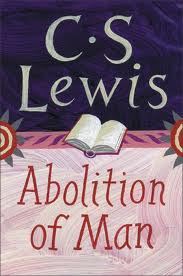The Question of God Part 8 (Lewis Segment, “Defender of the Faith“; Conversation 8, “Moral Law“)
As we near the end of our journey, our focus centers on Lewis and the question of an absolute basis for moral law. Just as Modernity reached its zenith in the mid-20th Century, Lewis was emerging as a widely-acclaimed author and an influential apologist for the Christian faith. The prospect of yet another global war question the progressive optimism of modernity’s most aggressive advocates. In place of moral uncertainty and existential angst, Lewis offered the security and comfort of Christian principles as the most sensible and rational remedy for these trying times.
Lewis quickly rose to fame in England in the 1940s after the director of religious programming at the BBC asked him to give some broadcast talks about faith during the Second World War. What started as an experimental series of five 15-minute broadcasts grew into a program fueled by popular demand, and later formed the core of the best-selling book Mere Christianity.
Lewis began by pointing to a basic moral law that came from outside human experience and revealed itself through reason (calling it the Tao, or “the way”). He advocated for an absolute basis for moral law by responding directly to two commonly-expressed modern presuppostions about morality: it is simply a product of cultural evolution (following after instincts) or a mere reflection of social conventions (following after consensus). The former proclaims its faith in progress; the latter places its faith in education. Lewis responds to these presumptions thusly,
- Instinct motivates us more toward self-preservation than toward the well-being of others; what would compel me toward a greater good when it comes at the expense of my own?
- When we face a moral dilemma, we often weigh conflicting choices. If the only “scale” we have available are consequences, how can we truly know which is the “right” choice to make?
- Moral choices are often not merely matters of right and wrong in particular circumstances; they also raise questions of ultimate ends that transcend temporal means. Which is the “better” choice?
- The differences between individual and cultural “conventions” may be great, but they generally apply to matters of minimal moral consequence. In matters of genuine moral consequence, there are rarely drastic differences between individuals and cultures.
- “Progress means not just changing, but changing for the better. If no set of moral ideas were truer or better than any other, there would be no sense in preferring civilized morality to savage morality”
Of course, Freud differed greatly from Lewis concerning the moral law. A God who was the basis of the moral law was consequently subject to accusations of infidelity and even wickedness for “allowing” bad things to happen to a people and a world he claims to love. “In view of these difficulties,” Freud writes in Civilization and its Discontents, “Each of us will be well advised, on some suitable occasion, to make a low bow to the deeply moral nature of mankind.” Faith in mankind’s “deeply moral nature” also motivated philosophical Pragmatism, whose main advocates, William James and John Dewey, placed the practical value of actions before principle-based assessments that weighed ends and means.
In ultimately connecting Moral Law with the Christian Tradition, Lewis counters another popular philosophy of his day, Existentialism. Philosophers like Heidegger and Sartre, along with writers like Camus, held that morality and meaning were products of human choices. To them, choosing defined “being,” and “existence” took priority over “essence.” Unfortunately, existentialism failed to offer any standard but one’s self for making “good” or “right” choices—leaving an entire generation at the mercy of “existential angst”!
Learn more about the Moral Law & Modern Philosophy—Anthony Campolo, Partly Right (Word Books, 1985); J Budziszewski, What We Can’t Not Know (Ignatius, 2002)

